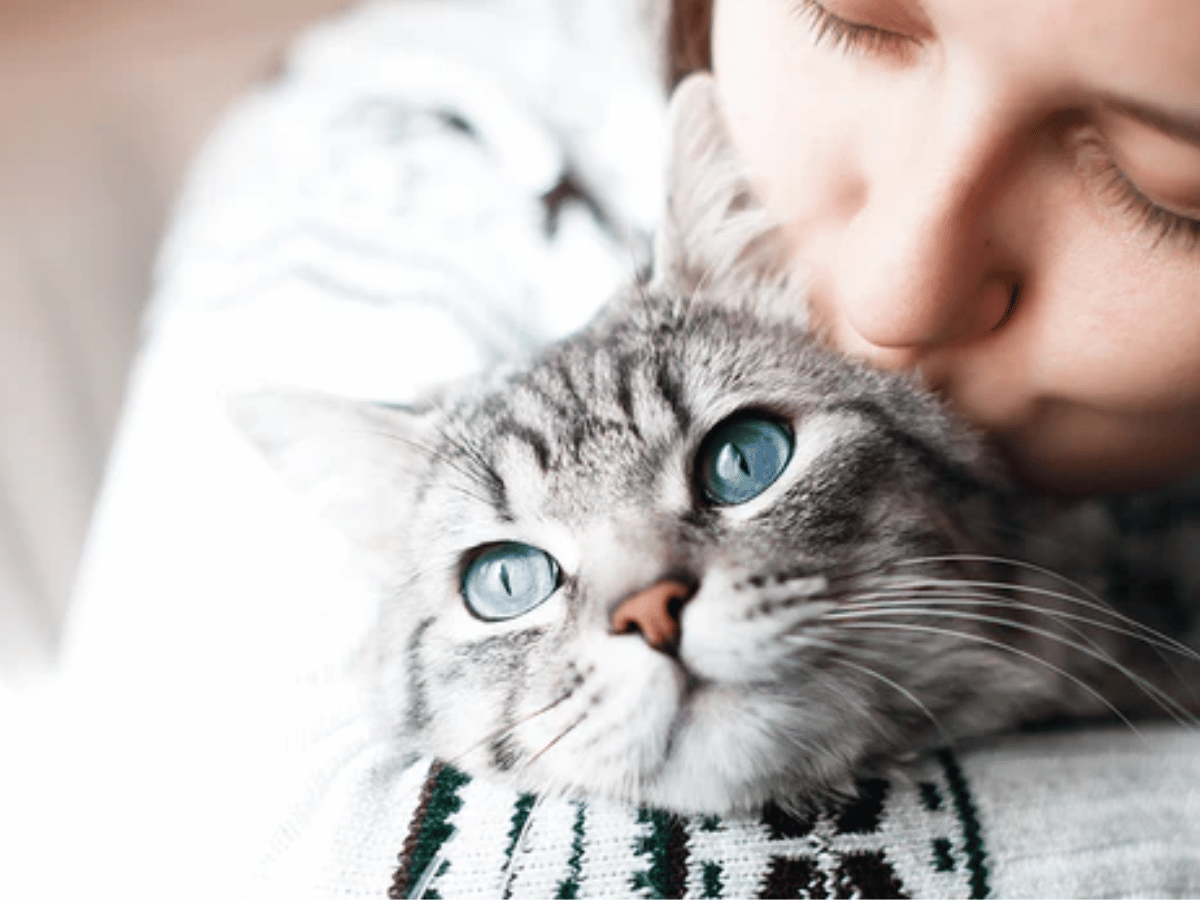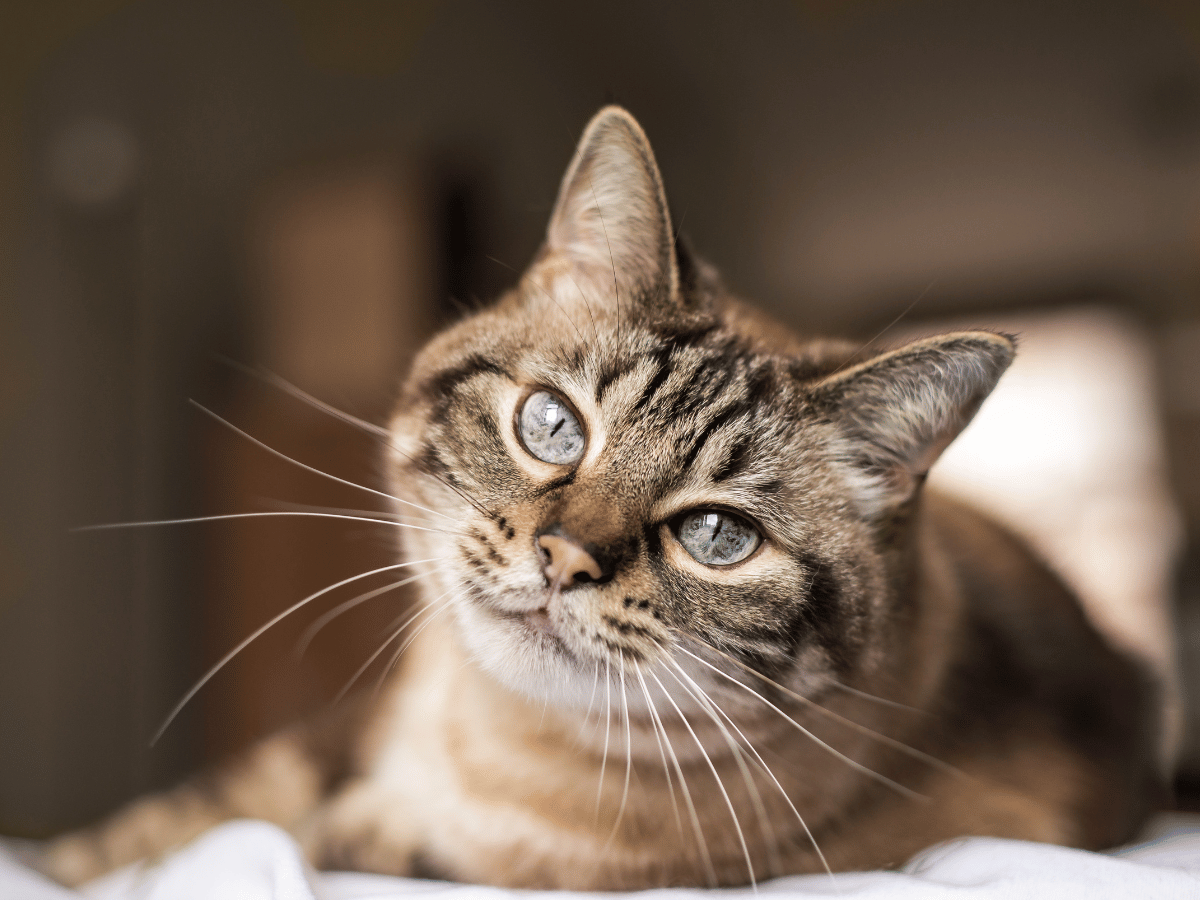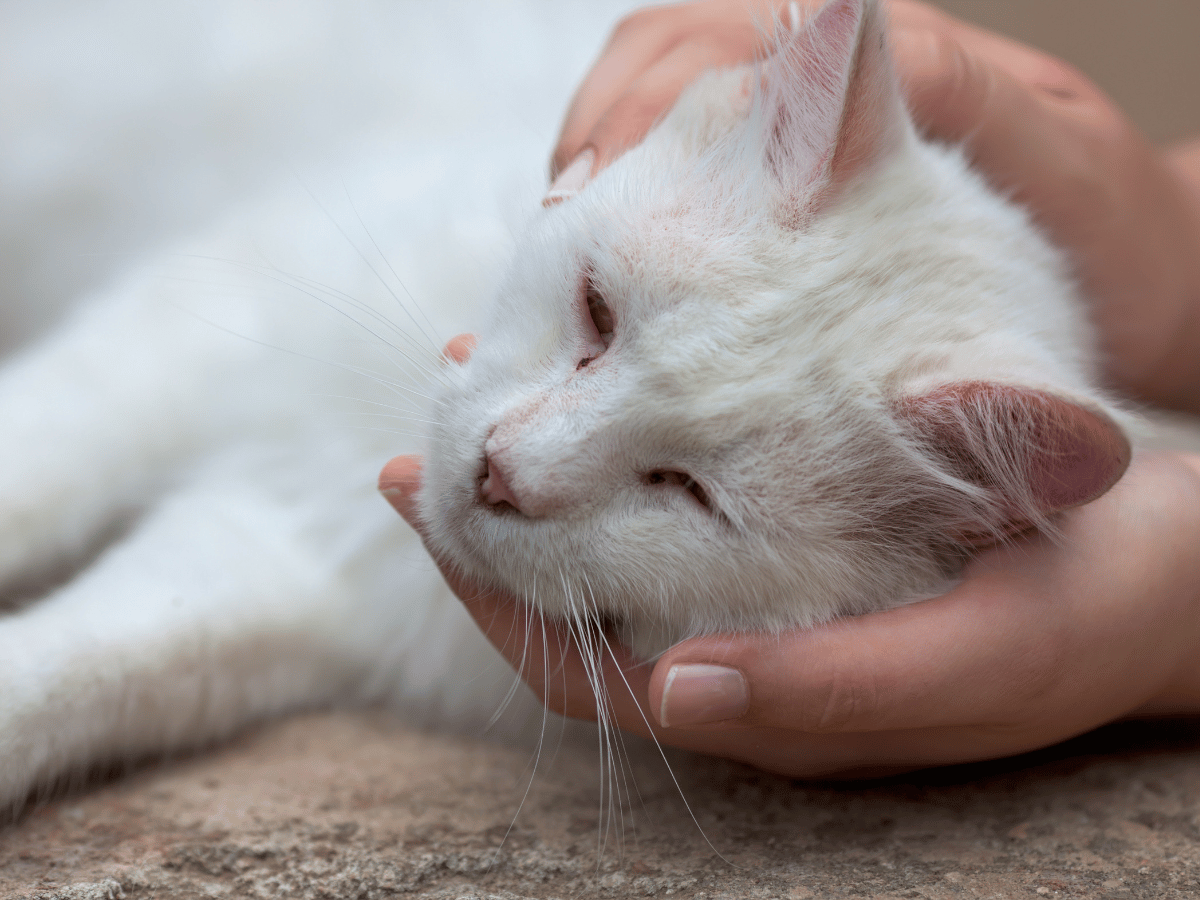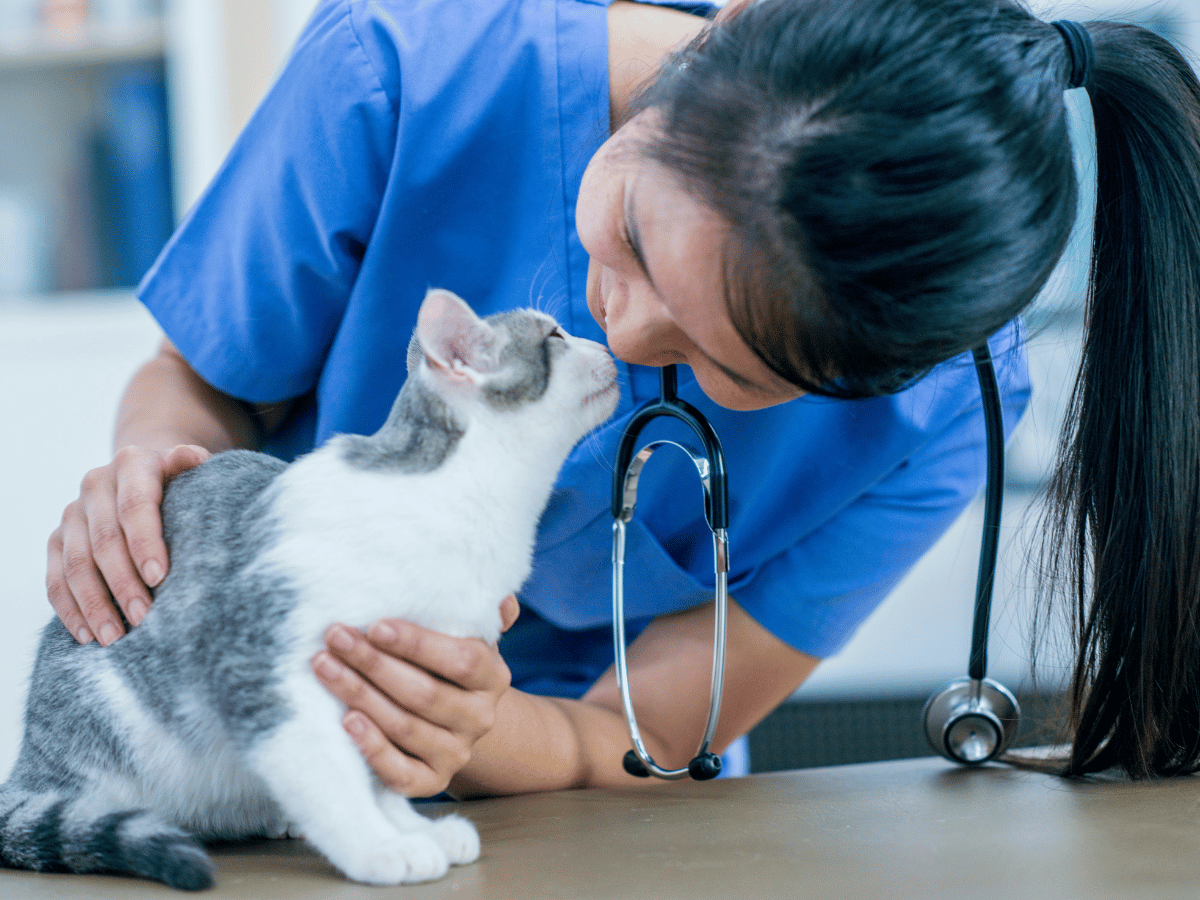
How to Help and Support Your Cat Naturally During Cancer 2025
What if cats truly possessed nine lives?
While their agility and resilience never fail to impress, our beloved felines are still vulnerable to serious illnesses. When faced with health challenges, they rely on their human caregivers for love and medical support.
Unfortunately, cancer does not spare cats. Similar to humans, they can develop various types of tumors and malignancies.
Receiving a cancer diagnosis for your cat is undoubtedly heartbreaking. Please know that you are not alone—we are here to offer guidance and comfort. We hope this article brings you clarity and assistance during this difficult journey.
- Find out more here: 👉 Support your cat’s recovery with our NATURAL solution🐱
As a veterinary technician, I have assisted in numerous tumor removal procedures. With the right medical approach and the unwavering dedication of their owners, many pets make remarkable recoveries.
Let’s explore what contributes to cancer in cats, the different types of tumors, and the warning signs to watch for.
Additionally, we will examine natural remedies that may support your feline companion’s well-being and potentially reduce tumor growth.
Understanding the Causes of Cancer in Cats

Tumors emerge when specific cells grow uncontrollably. Identifying the precise triggers of feline cancer can be challenging, but some risk factors have been linked to its development, such as obesity, secondhand smoke exposure, and certain viruses.
A tumor is deemed cancerous if it is malignant—meaning it grows aggressively, spreads through the bloodstream (metastasis), and has a high likelihood of recurrence. However, not all tumors are dangerous; some remain benign and do not pose a significant health threat.
Common Risk Factors for Cancer in Cats:
- Excess weight
- Inactivity
- Exposure to cigarette smoke
- Excessive sun exposure
- Feline Leukemia Virus (FeLV)
- Feline Immunodeficiency Virus (FIV, also known as feline AIDS)
Since FeLV and FIV spread through contact with other cats, allowing your pet to roam outdoors may increase their risk.
How Prevalent is Cancer in Cats?

Research indicates that one in five cats will experience cancer at some point.
While older cats are more prone to the disease, those with FeLV or FIV may develop it at a younger age.
Two of the most frequently diagnosed feline cancers are lymphoma and mammary tumors in females.
How to Identify Tumors in Cats?

Both benign and malignant tumors can present as lumps under the skin, though only lab analysis can confirm malignancy.
While benign tumors are typically harmless, they can sometimes lead to complications. For instance, a non-cancerous brain tumor might press against critical areas, causing neurological symptoms.
Internal tumors are even harder to detect, making it crucial to remain vigilant for warning signs.
Symptoms of Cancer in Cats

Cancer symptoms vary based on the affected organ or system. A noticeable lump under the skin may be an early indicator.
Changes in behavior and appetite can also signal an underlying health issue, so cat owners should remain attentive.
Signs to watch for include:
- Unusual growths or swelling
- Foul odors
- Vomiting
- Diarrhea
- Persistent wounds
- Reduced appetite
- Weight loss
- Coughing or breathing difficulties
- Lethargy and reduced activity
- Increased thirst
- Frequent urination
- Signs of pain or discomfort
Should you notice any of these symptoms, consult your veterinarian without delay.
For more details, explore these 10 early warning signs of cancer in cats. Detecting the disease early can be life-saving.
How Long Can a Cat Survive with Cancer or a Tumor?

The life expectancy of a cat diagnosed with cancer can vary widely. Some cats continue to thrive for years with proper treatment and care, while others may only have a few months. A veterinarian can offer the best prognosis based on the specific type and stage of cancer.
Factors such as the cancer’s aggressiveness, the cat’s age and health, and the effectiveness of treatments all contribute to determining survival time.
Regardless of the prognosis, ensuring the cat’s comfort and well-being should always be a priority. Quality of life matters most when navigating treatment decisions.
What to Expect in the Final Stages of Cancer
As cancer progresses, a cat’s condition may deteriorate noticeably. Symptoms such as weight loss, loss of appetite, fatigue, and discomfort become more apparent. The cat might become less active and prefer isolation.
The signs of late-stage cancer vary depending on the affected organs. For example, lung cancer may lead to respiratory issues, while bone cancer can cause difficulty moving. Consulting a veterinarian helps manage symptoms and ensure the cat remains as comfortable as possible.
Common Cancers Found in Cats

Just like in humans, feline cancers are classified by the location they develop. Some of the most prevalent include lymphoma, mammary tumors, and bone cancer.
Lymphoma in Cats
Affecting the lymphatic system, lymphoma is one of the most common cancers in cats. It primarily targets lymphocytes, a type of white blood cell, and can manifest in various organs.
Older cats or those infected with feline leukemia virus (FeLV) are more susceptible. Prognosis varies, but survival times range from a couple of months to a few years depending on treatment.
The most common form, intestinal lymphoma, accounts for about two-thirds of feline lymphoma cases.
Skin Cancer (Melanoma and Other Tumors)
Skin tumors, including melanomas, can appear anywhere on a cat’s body, though they are often found on the head, neck, and legs.
Malignant melanomas are rare but aggressive, often recurring after removal. Early detection increases the chances of successful treatment.
Other forms of skin cancer include basal cell carcinomas, mast cell tumors, and fibrosarcomas, some of which may appear after vaccinations.
Osteosarcoma (Bone Cancer)
Osteosarcoma is the most commonly diagnosed bone cancer in cats. It leads to abnormal bone growth, pain, swelling, and difficulty moving.
Unlike in dogs, feline osteosarcoma tends to have a better outlook. Cats diagnosed with this condition may live from one to four years depending on treatment.
Liver Cancer
The liver, which plays a crucial role in digestion and detoxification, can also develop cancerous growths. Symptoms often include vomiting, appetite loss, and digestive disturbances.
Not all liver tumors are malignant, and tests such as biopsies help determine the severity. While some types of liver cancer respond well to treatment, aggressive forms have a poorer prognosis.
Bladder Cancer
Although bladder cancer is rare in cats, persistent urinary issues should be investigated further. Symptoms can mimic urinary infections, delaying diagnosis.
Male and overweight cats are at higher risk of developing transitional cell carcinoma, the most common type of feline bladder cancer.
Stomach and Intestinal Cancer
Gastrointestinal cancers such as stomach lymphoma may cause symptoms like vomiting, weight loss, and reduced appetite.
Most stomach and intestinal tumors are malignant and can spread to other areas. This type of cancer is more common in older cats, particularly those aged 10 to 12 years.
Studies suggest male cats and certain breeds, like Siamese cats, are at a higher risk of developing intestinal cancer.
Oral Tumors in Cats
The most prevalent malignant tumor found in a cat’s mouth is squamous cell carcinoma, responsible for over 75% of oral cancers in felines.
Squamous Cell Carcinoma in Felines
Though commonly classified as a skin cancer, this aggressive tumor frequently develops within a cat’s oral cavity and can also appear on the nose or ears.
Due to its location, surgical removal is complex, and the tumor can severely interfere with a cat’s ability to eat. Additionally, chemotherapy is generally ineffective against this type of cancer.
Sadly, the prognosis is not favorable. Most affected cats survive between a few months and a year, with malnutrition often accelerating their decline.
For more insights on feline oral cancer, visit this page.
Lung Cancer in Cats
Primary lung cancer is relatively rare in felines, but metastatic tumors from other body regions frequently spread to the lungs.
Symptoms like persistent coughing and breathing difficulties should be evaluated promptly by a veterinarian, particularly in older cats, as their condition can deteriorate quickly.
Persian cats seem to be more prone to developing lung cancer. Moreover, exposure to secondhand smoke significantly increases the risk, mirroring its effects in humans.
Pancreatic Cancer in Cats
The pancreas plays a crucial role in digestion and blood sugar regulation, and cancer affecting this organ can take different forms depending on the affected cells.
Common symptoms include vomiting, diarrhea, and significant weight loss. Unfortunately, the prognosis is often grim due to late detection.
Once diagnosed, pancreatic cancer progresses rapidly. Most affected cats survive only a few weeks to months due to the cancer spreading throughout the body.
Mammary Tumors in Cats
Mammary cancer is among the most frequently diagnosed feline cancers. Studies indicate that 85% of cases are malignant, making early surgical intervention essential.
Unspayed females are at the highest risk, but sterilized cats can also develop these tumors.
Spaying a cat before six months of age drastically reduces the likelihood of mammary cancer by 91%, offering significant long-term health benefits.
Cats have four mammary glands on each side of their abdomen, and tumors can arise in any of them. In some instances, multiple growths appear along the mammary chain.
Feline Leukemia Virus (FeLV)
While not a type of cancer, feline leukemia virus (FeLV) weakens the immune system, increasing susceptibility to conditions like lymphoma.
In advanced cases, the virus spreads through the bloodstream, affecting white blood cells and bone marrow, similarly to leukemia in humans.
Although FeLV belongs to the same viral family as HIV, it does not affect humans. It is primarily transmitted through saliva, particularly when cats groom each other, share food bowls, or sneeze.
Outdoor cats face a heightened risk due to the virus’s contagious nature.
Fibrosarcoma in Cats
Fibrosarcoma is a malignant tumor that develops in connective tissues beneath the skin and can infiltrate muscle structures. It typically does not cause pain when touched but grows rapidly and may ulcerate.
Cats diagnosed with fibrosarcoma may live for up to three years. However, early detection and surgical removal significantly enhance survival chances.
Managing Cancer in Cats: Effective Approaches

Feline cancer treatments often mirror those in human medicine, including chemotherapy and radiation therapy. However, natural remedies can also provide additional support by boosting a cat’s immune system. Below are some treatment options.
The medicinal mushroom PiptoAnimo has been studied for its potential health benefits. It can be used as a supplement alongside conventional treatments to help improve vitality and overall well-being.
Formulated to enhance immune function, this natural remedy may aid in strengthening the body’s defenses while promoting resilience against cancer.
Reducing Tumors in Cats
Veterinary treatments such as chemotherapy and radiation therapy are commonly used to shrink tumors and eliminate residual cancer cells following surgery.
Although these methods can be effective, they may also impact healthy cells, leading some pet owners to explore holistic alternatives with fewer side effects.
Chemotherapy works by administering specialized drugs to target malignant cells, either through injections or oral medications. Interestingly, most cats tolerate chemotherapy better than humans, experiencing fewer severe side effects.
Radiation therapy is another widely used option, delivering precise radiation doses to shrink or eliminate tumors. Since cats need to remain still during the procedure, anesthesia is typically required.
In certain cases, surgical removal is also an option. For instance, a cat with a rapidly growing tumor between its shoulder blades successfully underwent surgery and made a full recovery.
Natural Approaches to Tumor Reduction
Beyond conventional treatments, various natural strategies may help slow tumor progression. These include a diet rich in antioxidants and the use of medicinal mushrooms to support overall health and immune function.
Supporting a Cat’s Well-Being Naturally During Cancer

Complementary therapies can serve as valuable allies alongside conventional treatments, helping to enhance a cat’s quality of life during cancer. In cases where surgery is necessary, natural remedies may support post-operative healing.
Optimizing Nutrition for Cats with Cancer
A tailored diet plays a vital role in a cat’s overall strength and resilience. Proper nutrition not only fortifies the immune system but may also contribute to slowing cancer progression. Certain ingredients are known to promote overall well-being.
Ensuring adequate hydration is just as essential. Providing fresh water and moisture-rich foods can help counteract dehydration, a frequent issue in ailing cats.
A diet rich in proteins and omega-3 fatty acids can assist in preserving muscle mass and sustaining energy levels throughout the treatment process.
Feeding Recommendations for Cats Battling Cancer
- High-quality protein: Lean meats, eggs, and high-protein diets help maintain muscle and strengthen the immune system.
- Healthy fats: Easily digestible options like fish oil or plant-based oils serve as an excellent energy source.
- Hydration: Access to clean water at all times is critical to avoid dehydration and associated complications.
- Encouraging appetite: If appetite declines, a veterinarian may suggest supplements or appetite stimulants.
- Specialized diets: Depending on the type of cancer, a tailored nutritional plan may be beneficial. Consulting a vet ensures the best approach.
- Frequent, small meals: Offering multiple small meals a day can be easier for a sick cat to tolerate.
The Power of Antioxidants
Free radicals—unstable molecules generated by metabolism—can harm cells, potentially contributing to disease progression, including cancer.
Antioxidants neutralize these harmful compounds, reducing oxidative stress and supporting cellular health. Incorporating antioxidant-rich foods into a cat’s diet may provide additional protection.
Cooked vegetables like carrots, broccoli, or butternut squash, in small portions, can offer a natural antioxidant boost without drastically altering dietary habits.
Curcumin: A Potential Natural Ally
Curcumin, the active component of turmeric, is renowned for its potent anti-inflammatory effects. Research suggests that it may also help slow the spread of certain tumors.
For this reason, curcumin is often incorporated into holistic cancer care. However, before introducing it to your cat’s diet, consulting a veterinarian is essential to ensure proper dosage and safety.
Medicinal Mushrooms and Their Healing Potential
Historically valued for their medicinal properties, some mushrooms are believed to have powerful immune-boosting capabilities.
Certain mushroom varieties have gained attention for their potential role in supporting cancer treatment. However, it is crucial to choose high-quality sources. Foraging for wild mushrooms is discouraged unless one has expert knowledge, as toxic species can resemble beneficial ones.
Notable medicinal mushrooms include chaga, shiitake, and cordyceps. These natural remedies can be used alone or in combination with veterinary treatments to help strengthen a cat’s overall health.
Preventative Strategies to Reduce Cancer Risk

Taking proactive steps can significantly decrease the likelihood of cancer in cats.
Minimizing exposure to harmful viruses, such as by keeping cats indoors, helps protect their immune system. Additionally, early spaying greatly reduces the risk of developing mammary tumors.
Final Considerations
Facing a cancer diagnosis in a beloved pet is never easy, but you’re not alone. Veterinary professionals, along with our team of experts, are here to guide and support you through every step.
Many cats have demonstrated incredible resilience. Even in difficult times, there is always hope.
Has your cat been affected by cancer? What treatment approaches have you explored? Share your thoughts in the comments.
If you need personalized guidance, don’t hesitate to reach out to us. You can also benefit from a free health consultation customized for your cat’s needs.


























19 comments
Bonjour Mme Lavoie, je compatis sincèrement. Sachez que nous sommes là pour vous soutenir, vous conseiller et vous aider dans ce moment difficile. Vérifier vos mails SVP, je vais vous répondre en privé. A très vite ! Cordialement.
Homéoanimo
Bonjour mon titi de 31/2 a un cancer de la peau
Détecter avec une gale sur son dos
J’attends les résultats de la deuxième analyse pour savoir à quel point c’est avancé etc
La vétérinaire étais sûr qu’il avait une allergie au puce
Je l’ai amené parce que je trouvais qu’il avait une drôle de forme il a grossi mais je le trouvais raboteux bcp de pellicules
Il mange joue mais pas comme normalement
On dirais qu’il a une bosse dans le ventre
Elle m’a dis il est juste gros
Finalement elle l’a tâté et m dis oui il est un peu dur
Sans être gonflé
Il a l’air d’avoir des douleurs mais pas constamment
Comment je peux le soulager en attendant je fais le nécessaire pour ne pas paniquer car j’ai peur
Dsl pour le message très long
🌹
Marie Lavoie
Bonjour Mr Baranger, je suis sincèrement désolée pour votre Titi. Nous allons tout faire pour vous aider. Veuillez vérifier vos mails, nous venons de vous contacter pour faire le point avec vous. A très vite ! Cordialement
Homéoanimo
Bonjour je viens d amener mon titi de 10 ans chat norvégien mâle chez le veto car il peine à respirer resultat soit un thymome soit un lymphome il a une masse dans le thorax qui pousse les poumons ce qui l empêche de respirer normalement demain matin biopsis et résultat d ici 10 jours , en attendant le résultat il auras un traitement à la cortisole, que me conseiller vous pour mon titi merci de vos réponse cordialement B.Eddie
Baranger
Bonjour Madame, Monsieur QUESTER,
Nous sommes désolés pour votre chat. Nous allons vous écrire un email pour en savoir un peu plus à son sujet et ainsi vous apporter une aide personnalisée.
HomeoAnimo.com
HomeoAnimo
Bonjour
Mon chat de six ans présente une boule au niveau du flanc gauche. Visite chez le vétérinaire une ponction est faite elle est rassurée…… traitement cortisone et antibiotiques. Je retourne chez le vétérinaire hier car la boule ne diminue pas échographie c’est une tumeur à nouveau ponction qui sera envoyée cette fois ci à un laboratoire. Chose qu’on aurait pu faire déjà il y a quinze jours…..vu sa tête ce n’est pas rassurant elle penche pour un sarcome. Je suis preneuse de toute aide j’aurais les résultats début de semaine prochaine la tumeur semble très profonde. Merci pour votre retour
Quester
Bonjour Madame , nous sommes vraiment désolés pour la condition de votre chat. Nous vous avons envoyé un mail pour vous donner des conseils adaptés et aussi vous poser quelques questions supplémentaires. Cordialement, Homeoanimo.
Homeoanimo
Bonjour, mon chat une masse en haut de son oeil, j ai était voir 2 vétérinaire pour avoir leurs avis, ils ont fait un prélèvement au microscope, c est une tumeur, le deuxième vétérinaire croit qu’ila des métastases et c’est trop risqué une chirurgie,pourl instant il se porte bien mais la bosse grossit très vite
Comment je peux l aider svp
Nany
‘Bonjour , Merci d’avoir contacté Homeoanimo! Je viens de vous envoyer une réponse par email pour aider chat diabétique qui a maintenant aussi un cancer . Nous espérons avoir de vos nouvelles bientôt. Passez une bonne journée!’.
Homeoanimo
Bonjour,
Notre chat est diabetique avec une injection d’insuline matin et soir depuis environs un an et aujourd’hui on a detercté une tumeur sous la langue
le chat refuse de manger et de boire il est très faible il est perfuse pour l’hydration avec rajout d ‘antalgique et de morphine à faible dose.
ça fait près d’une semaine qu’il ne mange pas il est faible comment le faire mangé car sça se complique pour lui avec son diabète qu’on ne gère plus vu qu’il ne mange pas.
Avez vous des solutions?
Merci
Houache
Bonjour M. Fabrice, Nous sommes vraiment désolés pour votre cha!. Nous allons vous faire parvenir sous peu un mail pour discuter plus en profondeur de sa santé. À bientôt! Homeoanimo.com
Homeoanimo
bonjour Madame mon chat de six ans,maigri a vu d oeil malgres le fait qu il mange et boit toujours normalement,a l automne dernier il etais infesté de puces ,je l ai traité un peu tardivement ,car il avais vraiment une centaine de puce qui c etaient refugiées dans son dos ,ou il ne pouvais ni se gratter ni se lecher,depuis l elimination des puces il deperi,pouvais vous m aider car je suis desesperé merci de votre reponse rapide
thomas fabrice
Bonjour Mme Corno, Merci de nous contacter avec vos soucis pour la santé de votre chatte. Nous vous avons envoyé hier un email avec quelques questions pour mieux comprendre sa situation. Nous attendons vos réponses pour vous aider et votre chère chatte. À bientôt!
Homeoanimo
Mon chat a une boss prèe de l oeil et sont nez coule que doivent faire Elle mange très bien
Manpn
Bonjour, mon chat a eu une infection utinaire, puis on lui a diagnostiqué une insuffisance renal, et au vue de son état qui se dégrade perte de poids énorme, excès de boissons, faiblesse, changement de comportement, et de mollement, je les emmenés chez le vétérinaire qui a diagnostiqué un cancer des reins (lymphome) sans faire aucune analyse, il a vue la taille de ces deux reins doublé de volume. Ma question est: est ce que une chimio peut le sauvé ? Car le vétérinaire ma dit que c’était un stade trop avancé.. mais en même temps il a fait aucune analyse..
El Amouri
Merci beaucoup pour votre commentaire Madame Lannoy,
Nous vous avons fait parvenir un courriel de questions hier afin de vous aider avec votre animal. N’hésitez pas à communiquer avec nous si vous avez des questions! Cordialement, Homéoanimo.com
Claudine Lannoy
Bonjour
mon chat de 15 ans maintenant a des taches de sang dans un oeil. le vétérinaire soupçonne un cancer de l’oeil.
la première tâche est apparue il y a trois ans environ. il ne souffre pas et mange bien. je tiens à préciser que mon chat a eu un greffe à l’oeil étant petit suivi d’un ulcère (suite à une bagarre). je ne tiens pas que l’on enlève l’oeil. pas de gène visuel. existe t_il un traitement ?
claudine lannoy
Merci beaucoup pour votre commentaire, Mme Lalande. Nous sommes heureux de savoir que votre chatte va mieux! Ça nous fait plaisir d’avoir des nouvelles des animaux que nous aidons. Cordialement, Homeoanimo.com
Homeoanimo
Bonjour, je donne à ma chatte le produit PollenAnimo printemps depuis le 24 avril dernier. En quelques jours, ma chatte a cessé de se gratter les oreilles de façon obsessive et elle est plus calme. Je suis très contente d’avoir ce produit pour la soulager .
Francine Lalalande
Leave a comment
This site is protected by hCaptcha and the hCaptcha Privacy Policy and Terms of Service apply.